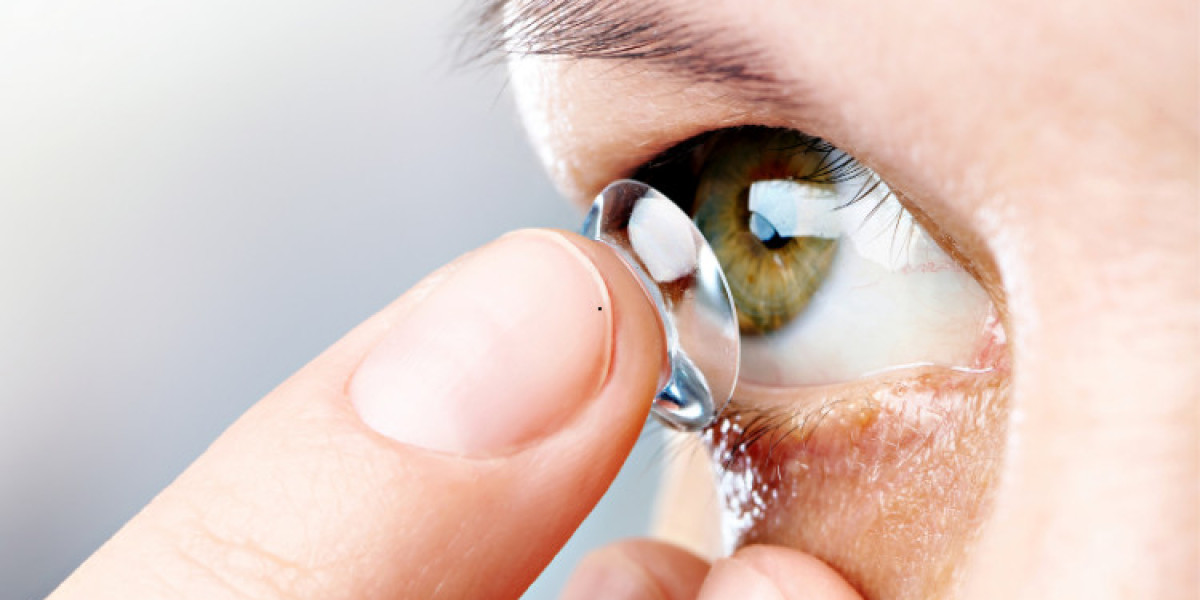Contact Lenses Market Analysis
Global Contact Lens Market will have reached US$ 15.41 billion by 2032 from US$ 9.67 billion in 2023, with a CAGR of 5.31% between 2024 and 2032
Contact lenses are thin, curved lenses placed on the eye's surface to correct vision or manage certain corneal conditions. They come in various sizes, shapes, and materials, including soft, rigid, gas-permeable, and hybrid lenses. Contact lenses can correct refractive errors such as Myopia, hyperopia, astigmatism, and presbyopia and treat eye conditions like keratoconus. The global contact lens market is growing due to increasing adoption and the rising prevalence of refractive errors.
Request a free sample copy of the report: https://www.renub.com/contact-lens-market-p.php
Contact Lens Market Trends
Increasing awareness of eye health: Age-related macular degeneration (AMD) is a condition that causes severe vision loss in older individuals. It affects approximately 196 million people worldwide, including 20 million in the US. The risk of developing AMD increases with age. By age 60, about 1 in every 200 people has AMD, and by age 90, 1 in 5 people are affected, according to a PubMed article from 2024. In August 2021, it was reported that keratitis occurs in 2 to 20 per 10,000 contact lens wearers in the United States, as per Harvest Health. The increase in the number of crucial strategy adoptions by major manufacturers and the rise in product launches provide an opportunity for the contact lens market to grow.
Rising prevalence of Myopia and presbyopia: The number of people with vision impairment is increasing globally due to a rise in cases of Myopia and presbyopia. Uncorrected refractive errors are a significant cause of blindness worldwide, and the reluctance to seek vision correction only exacerbates the issue. Myopia, or nearsightedness, is becoming increasingly common across the world. It is estimated that nearly half of the global population will be affected by 2050. Severe nearsightedness can result in serious and long-lasting vision problems due to complications. Efforts have been made to slow the progression of Myopia through optical and pharmaceutical measures to prevent blindness.
The increasing number of older adults worsens the occurrence of eye disorders: Approximately 1.3 billion individuals globally experience vision issues, with a higher prevalence observed in people over 50. Contributing factors to these vision problems include uncorrected refractive errors, cataracts, glaucoma, and diabetic retinopathy. It is worth noting that around 80% of these vision problems can be prevented through early detection and suitable interventions. The most commonly utilized solutions for vision impairments are glasses and contact lenses. These options often assist in correcting refractive errors and enhancing visual acuity. Many individuals opt for these non-invasive solutions over eye surgery due to their convenience and relatively lower risk.
United States Contact Lenses Market
The demand for contact lenses in the United States is rising, driven by the increasing prevalence of visual impairments. Contact lenses are becoming increasingly popular due to their ability to provide wearers with accurate visualization and excellent visual clarity. According to a survey conducted by the Contact Lens Institute, 75% of contact lens users reported feeling that wearing contact lenses provided a natural and comfortable experience. This positive feedback is expected to fuel the continued growth of the contact lens market in the years to come. Additionally, the US Census Bureau projects that the population of individuals aged 65 and older will reach 98 million by 2060, further indicating the potential for sustained demand for contact lenses.
Contact Lenses Company Analysis
Several contact lens market enterprises include Bausch & Lomb Incorporated, Alcon, Carl Zeiss Meditec AG, The Cooper Companies, Inc., Hoya Corporation, EssilorLuxottica, Menicon Co. Ltd, and Seed Co. Ltd.
Contact Lenses Company News
The company's recent developments lead to increased product approval and market growth. Due to increased development strategies, such as product launches and acquisitions, the contact lens industry is expected to experience growth.
· Cooper Vision acquired No7 Contact Lenses in April 2021, and Bausch+ Lomb received approval for their monthly silicone hydrogel contact lenses in China in June 2020.
· CooperVision launched MyDay Energys in the U.S. in March 2023. It's a 1-day contact lens that helps alleviate tiredness and dryness caused by digital eye strain. MyDay Energys combines a CooperVision-exclusive aspheric design and material technology, delivering extraordinary comfort.
· Alcon launched TOTAL30 for astigmatism in January 2023. It's the first reusable contact lens with water gradient material for astigmatic wearers.
Company collaboration
· In April 2021, Johnson & Johnson Vision partnered with Menicon to develop products and services for managing Myopia in children.
· In October 2023, ZEISS Ventures invested in Vibrosonic, a Germany-based developer of innovative hearing solutions using patented hearing contact lens technology.
Material – Contact Lenses Market breakup in 3 viewpoints:
1. Gas Permeable
2. Silicone Hydrogel
3. Hybrid
Usage – Contact Lenses Market breakup in 4 viewpoints:
1. Daily Disposable
2. Disposable
3. Frequently Disposable
4. Traditional (Reusable) Lenses
Design – Contact Lenses Market breakup in 3 viewpoints:
1. Spherical
2. Toric
3. Multifocal
Application – Contact Lenses Market breakup in 2 viewpoints:
1. Vision Correction
2. Cosmetic
Distribution Channels – Contact Lenses Market breakup in 3 viewpoints:
1. Online Pharmacy
2. Retail Pharmacy
3. Hospital Pharmacy
Country – Contact Lenses Market breakup in 25 viewpoints:
North America
1. United States
2. Canada
Europe
1. France
2. Germany
3. Italy
4. Spain
5. United Kingdom
6. Belgium
7. the Netherlands
8. Turkey
Asia Pacific
1. China
2. Japan
3. India
4. Australia
5. South Korea
6. Thailand
7. Malaysia
8. Indonesia
9. New Zealand
Latin America








